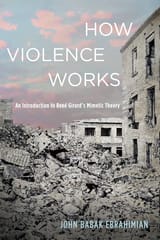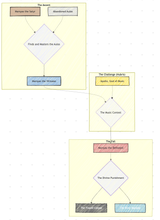>>24527936Gemini-slop below because I can't synthesize it yet. It's fucking shit. I'm fucking angry.
The discussion here about being "free from freedom" seems to circle a core anxiety. It's captured perfectly in this parable:
You give him your phone, you give him your money
Not enough
You give him your car keys, you let him in your house
Not enough
You give him your wife, you give him your life
Not enough
You let him stab you for the 123rd time
Not enough
You've been dead for 11 days, he has killed you 32 times
Still not enough
Your sacred ghost now floats above his head
"Enough enough, make it stop!" he says
This is a vision of hell. It's a loop where resources are given but never consumed, and a desire is expressed but never fulfilled. To understand this loop, we need to look at the shape of things.
Think about any process, like baking a pie. It has a structure, a flow. You start with eggs and sugar, you transform them into meringue, and so on. We can draw this. The drawing is a graph: the ingredients are points, the actions are arrows.
The surprising thing is this: the very idea of "using something up" is a property of this drawing's shape. The arrows only go one way. An egg, once used, is gone. The path doesn't loop back to let you use it again. This one-way structure is what it means to be a consumable resource. Its consumability is its topology.
Now, think of desire. Desire is the mirror image of this graph. It's the mold to the cast, the shadow to the object. The desire for a pie is a kind of "negative space" that has the exact shape of the recipe required to make it. To want the pie is to implicitly want the meringue and the crust. A desire is fulfilled when its corresponding resource is created, plugging the hole, satisfying the shape.
This is the "desired yoke" some of you have mentioned. It isn't the absence of structure, but a perfect alignment of two structures: the graph of our actions (the recipe) and the co-graph of our intentions (the desire). To be "free from freedom" is to escape the anxiety of a misaligned, empty structure and find this one, where what we do perfectly fulfills what we want.
But this alignment can break. It breaks in two astonishing ways.
First, there's the wedding feast where every guest is supposed to bring wine to fill a common barrel. One guest thinks, "If I bring water, and everyone else brings wine, no one will notice." The problem is, this thought is an attractor. Every guest has it. They all bring water. They all drink water. Here, the desire (a festive wine) was clear and the plan was sound. But the execution was corrupted. Each person, following their own local logic of optimization, contributed to a collective catastrophe. This is the world of min/max, a world without nuance.










